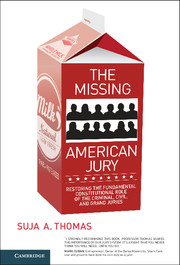 The Missing American Jury
The Missing American Jury 2 - The Fall of the Criminal, Civil, and Grand Juries and the Rise of the Executive, the Legislature, the Judiciary, and the States
from PART I - The Jury Now
Published online by Cambridge University Press: 05 June 2016
Summary
When America was founded, criminal, civil, and grand juries were integral to government in both England and the colonies. Between the founding and today, power shifted from juries to other governmental institutions – the executive, the legislature, the judiciary, and the states – the very entities that juries were to check.
The Vibrant Jury of the Late Eighteenth Century
The jury has a long history in England. Informed by this past, the American colonists and the Founders understood that the jury restrained the government and preserved liberty. From their experiences in England and in the colonies, they also learned what could happen without juries. For example, they knew of the Star Chamber, a court of law – composed of judges, Parliament members, and other leaders – through which the monarchy abused authority by prosecuting people for political reasons. The colonists and Founders also suffered from aggressive actions by Parliament and royal judges: Parliament rescinded their legislation; royal judges removed from colonial juries cases regarding whether taxes should be paid on goods; and English courts heard some of the crimes that English officers committed in the colonies.
When the Founders established their government, they wanted juries. Their desire was expressed in several discussions about the jury before the enactment of the Constitution. Delegates of several state assemblies gathered and proclaimed the necessity of the jury to preserve liberty. The First and Second Continental Congresses asserted Americans' entitlement to criminal and civil juries. The colonists adopted the Declaration of Independence in part because the King repeatedly had deprived them of trial by jury. Before the Constitutional Convention, all of the states with written constitutions provided some right to a jury trial. As William Nelson has observed “[f]or Americans after the Revolution, as well as before, the right to trial by jury was probably the most valued of all civil rights.”
The original Constitution provided the right to a jury trial for all crimes, except those of impeachment, but included no other jury rights. Concern about this omission and the constitutional power over law and fact that was granted to the Supreme Court on appeal delayed the Constitution's ratification.
- Type
- Chapter
- Information
- The Missing American JuryRestoring the Fundamental Constitutional Role of the Criminal, Civil, and Grand Juries, pp. 11 - 48Publisher: Cambridge University PressPrint publication year: 2016


